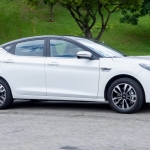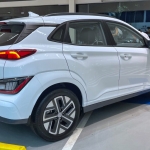The Impact of Price Reductions on the Electric and Hybrid Car Market
The drop in electric and hybrid car prices in Brazil in the second half of 2023 has truly revolutionized the market. Besides making these models more affordable, these changes also reflect a global trend toward a more sustainable, lower-carbon automotive market.
Opening the Market to New Consumers
Until recently, electric and hybrid cars were seen as luxury products, with high prices that turned many consumers off. However, with recent price reductions, a new segment of consumers is becoming willing to consider purchasing a sustainable vehicle.
With the arrival of models like the BYD Dolphin EV, starting at R$ 149,800, the scenario changed significantly. The launch price of this model challenged the idea that electric cars are inaccessible to most Brazilians, representing a true democratization of access to the electric vehicle market in the country.
What does this mean for the consumer?
-
More options and more accessibility: With price reductions from brands like Hyundai, Peugeot, and BYD, consumers now have a wider range of vehicles at more affordable prices.
-
Healthier competition: Automakers are now more willing to invest in innovation and lower prices to remain competitive. This not only benefits consumers but also accelerates the development of new technologies, making electric and hybrid cars more efficient.
The Role of Public Policies and Tax Incentives
Another important point to understand the price reductions of electric and hybrid cars in Brazil is the role of public policies and tax incentives. The Brazilian government has adopted several measures to encourage the purchase of these vehicles, aiming to reduce the transportation sector's carbon footprint.
THE vehicle ownership tax (IPVA), for example, has benefits for electric cars, which may be exempt or have significant discounts depending on the state. Furthermore, Electric Mobility Incentive Program has been one of the measures to boost sales of these vehicles. This, combined with the growing trend toward stricter environmental policies, has contributed to making electric cars more attractive.
Technology and Innovation: The Future Is Here
Price reductions are not just a matter of competitiveness, but also of technological innovationWith constant advances in batteries, propulsion systems, and production cost optimization, electric cars are becoming increasingly accessible and functional.
A good example of this is the BYD Dolphin EV, which offers a 400 km autonomy on a single charge, something that was unthinkable for lower-priced vehicles just a few years ago. This advancement reflects automakers' efforts to make electric cars more viable for Brazilian consumers' daily lives.
Additionally, most of these cars offer connectivity and driver assistance systems state-of-the-art, including partial autonomous driving assistance, fast recharge, and advanced infotainment systems. These features are attracting consumers who seek not only fuel economy but also the experience of driving a modern, cutting-edge car.
What to Expect for the Future?
With prices falling and more models being launched in Brazil, we can expect a continuous growth in the electric and hybrid car market. The potential for expansion of this market is huge, since Brazil has a large network of chargers and has increasingly adopted incentives for sustainable vehicles.
Furthermore, the international automakers are beginning to see Brazil as a strategic market for the sale of electric cars. Companies like Tesla, Volkswagen, Nissan, and others have already expressed interest in expanding their operations to the country. The arrival of more brands in the market may further expand the options, which will benefit consumers with models with different price ranges, features and technologies.
The Dilemma: Is It Worth Giving Up Gasoline Now?
With all these changes, many consumers are asking themselves: Is it worth buying an electric or hybrid car now?
The answer depends on a number of personal and economic factors:
-
Total Cost of Ownership (TCO): Although the initial price of an electric or hybrid car has fallen, the total cost of ownership must also be taken into account. This includes maintenance, recharge and tax subsidies. Compared to the maintenance cost of a gasoline car, electric cars tend to be cheaper in the long run, due to the lower maintenance requirements and the lower cost of “fuel” (electricity).
-
Autonomy and charging infrastructure: For those who live in large urban centers, the charging infrastructure is already relatively well developed. However, for those living in more remote areas, the lack of charging stations can be a limiting factor. autonomy of electric cars it also needs to be compatible with the consumer's daily use.
-
Sustainability and environmental benefits: The choice of an electric or hybrid car can also be motivated by environmental valuesAnyone who wants to reduce their carbon footprint and contribute to a more sustainable planet can see purchasing an electric car as an important step in that direction.
-
Government incentives: Many states and municipalities offer IPVA exemption for electric cars, and some cities are already implementing exclusive tracks for electric vehicles. This can represent significant savings, making electric vehicles even more attractive.
Conclusion: The Future of Electric Cars in Brazil Is Happening Now
The electric and hybrid car market in Brazil is undergoing a transformation, and the drop in prices for the most popular models is just the beginning. With more options and fiercer competition, consumers have more choice, which will certainly contribute to market growth.
If you're thinking about ditching gasoline and investing in a more sustainable car, now might be the right time. Although there are still challenges to overcome, such as charging infrastructure and the starting price of some models, the long-term advantages—both financial and environmental—are undeniable.
Furthermore, with continued advancements in technology and market competition, the price of electric and hybrid cars may continue to fall, making them increasingly affordable for Brazilian consumers.
If you are interested in entering the world of electric cars, stay alert for opportunities and consider which model best suits your lifestyle. The future of the automobile is becoming more sustainable and affordable, and you can be part of this green revolution.
Are you ready for the transition? What do you think of the recent price drops for electric and hybrid cars in Brazil? Share your opinions and ask questions in the comments!







